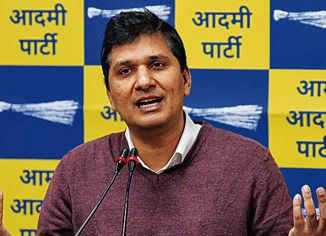
Illustration: Sandeep Joshi
...
India’s population and emissions are rising fast. We are striving to balance out economy and environment by advancing strategies like investing massively in renewable energy. As World Environment Day (June 5) draws closer, here’s a new research on the danger lurking in the sky, not only for us, but also for the world.
Emissions of some ozone-depleting Chlorofluorocarbons (CFCs) have shot up in the past six years, despite a decades-old treaty banning them altogether. “Atmospheric detective work” has pinpointed a mysterious new source in East Asia that might be responsible for this surge in destructive chemicals.
The ozone layer protects the Earth from the sun’s harmful UV radiation. Its decline sparked concerns in the 1980s about the rising rate of skin cancer. When scientists first discovered the ozone layer hole in 1985, they quickly attributed its appearance to the presence of CFCs in the atmosphere. Having established the threat, the world rapidly mobilised to bring the Montreal Protocol into effect just two years later, an act that saw CFCs being phased out.
The protocol has been credited with the ozone hole shrinkage observed in the decades that followed. However, in a new paper published in the journal, Nature, scientists report an unexpected finding of CFC-11, one of the major ozone-depleting chemicals. The rate of this substance’s decline in the atmosphere has slowed by approximately 50 per cent since 2012. This suggests new CFC sources have emerged in recent years, hampering the international effort to completely rid the atmosphere of these chemicals.
If their results are accurate, they indicate foul play. There has been no additional CFC production reported to the United Nations Environment Programme’s Ozone Secretariat in the past six years. If there had been, it would be breaking the terms of the Montreal Protocol. “This is atmospheric detective work at its finest,” said Professor Piers Forster, a climate scientist at the University of Leeds who was not involved in the work.
“Looking at detailed observations of north-south gradients in gases and combining this with careful atmospheric chemistry modelling, the authors have pinpointed a new source of CFC-11 to East Asia, breaking Montreal Protocol rules. Such detailed forensic analysis really shows how far our science has come. I’m hopeful we can quickly find the source and close it down.”
UNPREPARED INSURERS
Last year, insurers had paid a record $135 billion to cover losses from natural disasters worldwide. Anticipating similar calamity pain, a study shows that most US insurance companies have not adapted their strategies to address the dangers of climate change, making them likely to raise rates or deny coverage in high-risk areas.
With predictions of an above-average Atlantic hurricane season approaching, thousands of people could be unable to afford insurance protection or lose it altogether, said the Canadian research study published in the British Journal of Management.
Scientific consensus holds that climate change increases the intensity and frequency of extreme weather, from hurricanes to flooding. Last year, three record hurricanes struck the Gulf of Mexico and the Caribbean, causing billions of dollars in damages. Yet insurance and reinsurance companies overwhelmingly continue to treat storms as “anomalous rather than correlated to climate change,” the study said.
“Insurers that ignore climate change will not put away enough money to cover their claims. To re-coup those losses, they’ll have to raise rates or pull coverage from high risk areas,” said lead author Jason Thistlethwaite, an assistant professor of environment and business at the University of Waterloo. They will face whopping payouts associated with disasters, he said. “When this shift happens, thousands of people will lose coverage or it will be unaffordable,” he said.
BUSINESS OF MINDFULNESS
Let us take a pledge to adopt mindfulness to mark Mental Health Awareness Week (May 14-20). Here’s a story which explains why it is important.
Peter Bostelmann, an industrial engineer at Europe’s technology giant SAP, discovered meditation during a personal crisis a decade ago. The impact was so profound that he persuaded his employer to start pilot mindfulness training in 2013.
“It’s the new jogging,” said Bostelmann, who now runs a global mindfulness programme at SAP. “Employees are more healthy and engaged and they can cope better with a changing world.”
Now, SAP is rolling out mindfulness training to all 22,000 German staff and offering consulting services to other firms. It teaches them to pay attention to the present moment, and tune in to thoughts, feelings and surroundings.
Of SAP’s 91,000 employees, 6,500 have participated in a two-day programme, including several top executives. Another 5,500 are on a waiting list, with 21 trainers employed in 20 locations around the world and another 20 set to join in July.
After the training, SAP employees often start meetings with a minute of stillness. Groups also get together to practise “mindful” eating and walking in their breaks, slowing down and paying full attention to their chewing or their steps.
CAUGHT NAPPING...
If you’re a Chinese high school student, doze off in class at your risk.
High school students in one Chinese school may want to think twice before dozing off in class. Artificially intelligent cameras with facial recognition tools will be watching. The Hangzhou No. 11 Middle School has installed a “smart classroom behaviour management system”, which captures students’ expressions and movements, analysing them with big data to make sure they’re paying attention.
“The system only collects students' facial expressions and behaviour information,” said Zhang Guanqun, the school's vice principal. “It can improve interactions between the teachers and students.” The system will be able to tell if students are reading or listening - or napping at their desks. It can detect expressions like happiness, repulsion, fear, anger and befuddlement.
Students will get a real-time attentiveness score, which will be shown to their teacher on a screen, media said.
FOR A CAUSE
In India, staring is one of the most routine experiences that women go through. But in Nigeria the experience is different.
Whenever the all-women Nigerian biker group D’Angels hits the streets, people would stare in amazement at the sight of women on motorbikes. So they made up their minds to use the attention for a good cause.Enter the Female Bikers Initiative (FBI), which has already provided free breast and cervical cancer screening to 500 women in Nigeria’s commercial capital Lagos.
This August, D’Angels and another women biker group in Lagos, Amazon Motorcycle Club, plan to provide free screening to 5,000 women — a significant undertaking in a country where many lack access to proper healthcare.
“What touched us most was the women,” D’Angels co-founder Nnenna Samuila, 39, said. “Some asked if the bikes really belonged to us. Some asked if they could sit on our bikes. We decided to use the opportunity to do something to touch women’s lives.” Breast and cervical cancer are huge killers in Nigeria, accounting for half the 100,000 cancer deaths each year, according to the World Health Organization.
—The Independent and Reuters



























